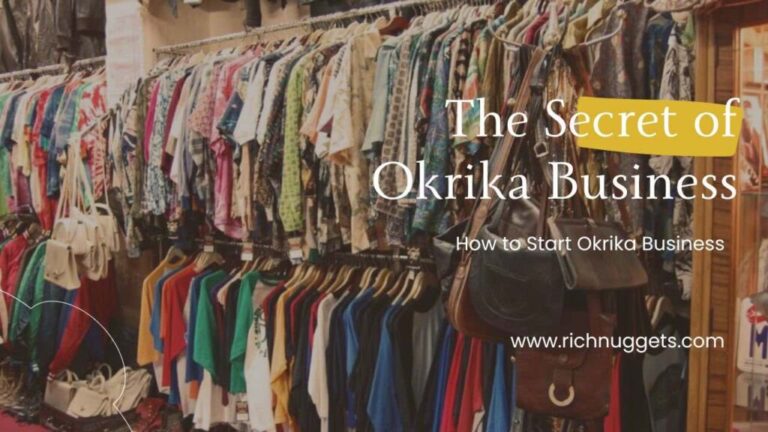Feeling tired of the same old routine and daydreaming about running your own show? Then this article; “How to Start a Pressure Washing Business” is for you.
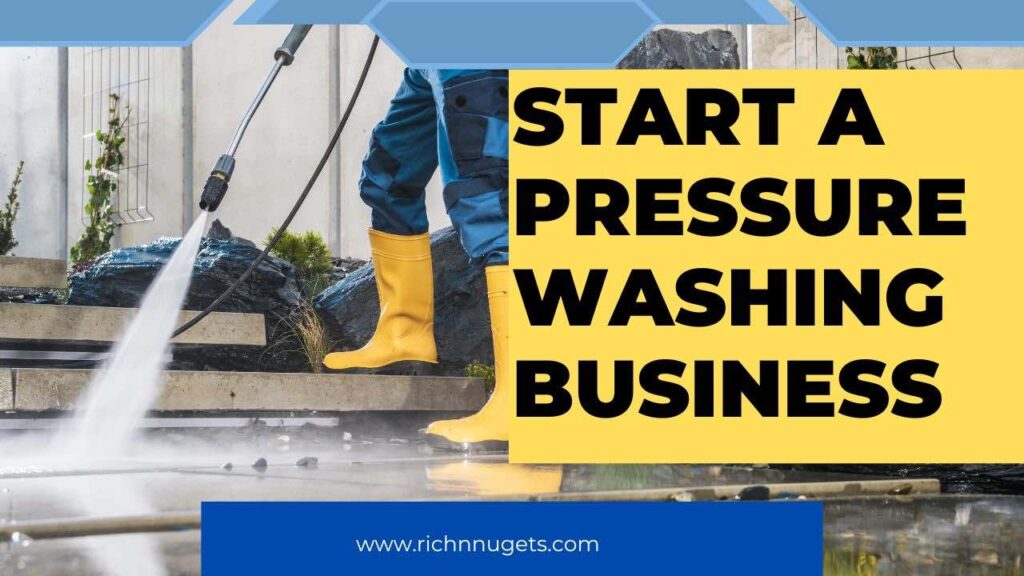
If you have a passion for maintaining cleanliness and an undeniable desire to take charge, then establishing a pressure washing business could be the perfect opportunity for you.
Just picture it: working outdoors, transforming dirty surfaces into spotless ones, and reaping substantial profits in the process.
Whether you’re an experienced entrepreneur or a novice exploring the world of business ownership, this comprehensive guide will lead you through the essential steps to launch your very own pressure washing venture.
From acquiring the right equipment to promoting your services, we will provide you with valuable insights and tips to thrive in this highly lucrative industry.
So, get ready to roll up your sleeves, create a significant impact, and plunge into the realm of starting a pressure washing business!
But before we delve into the main focus of how to start a pressure washing business, let’s look at some questions that deserve answers concerning starting a pressure washing business.
Table of Contents
Residential vs. Commercial Pressure Washing:
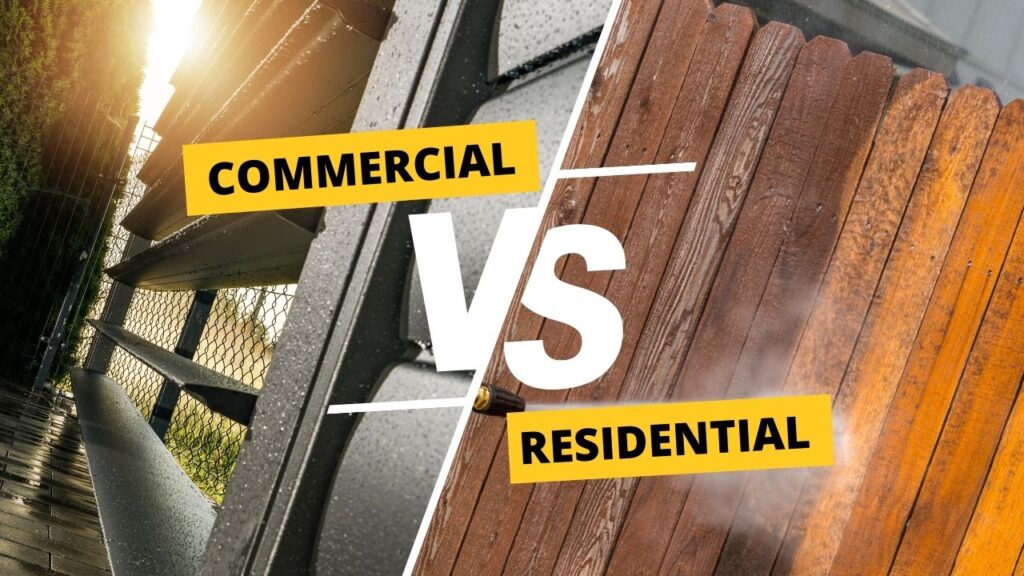
When venturing into the pressure washing industry, one of the first decisions you’ll face is whether to start with a residential or commercial focus.
For those on a tight budget, beginning with a residential pressure washing business is recommended.
This allows you to develop a customer base, refine your processes, and accumulate savings for future investments.
However, it’s worth noting that many entrepreneurs in the industry cater to both residential and commercial properties to maximize their revenue potential.
While residential work provides a steady stream of clients, the real money often lies in commercial pressure washing services.
Securing a single commercial contract can exceed the value of multiple residential clients combined.
If you’re keen on starting a commercial pressure washing business, consider reaching out to small businesses in your area, such as car dealerships, restaurants, and apartment complexes, as they typically require regular pressure washing services.
Is a pressure washing business profitable?
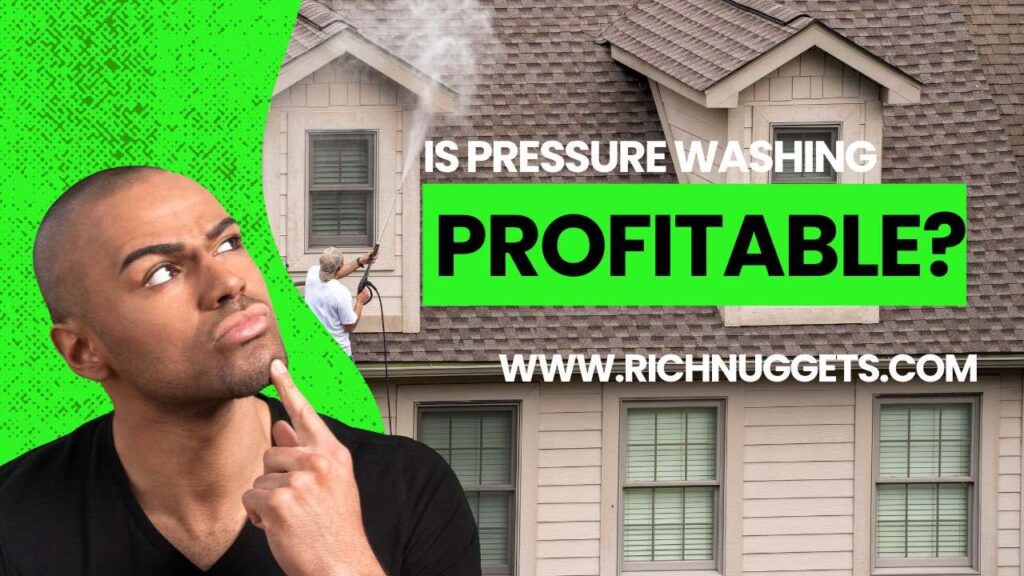
Yes, a pressure washing business is a very profitable business venture. You can earn between $40,000 – $200,000 per annum from this business.
The profitability of a pressure washing business depends on various factors, including the market demand, pricing strategy, operational efficiency, and customer base.
Here are a few reasons why a pressure washing business can be a profitable venture and they are also the benefits of running a pressure washing business.
a) High Demand: Pressure washing services are in demand for both residential and commercial properties.
b) Repeat Business: Many customers require regular pressure washing services to maintain the cleanliness of their properties. This can lead to recurring business and long-term customer relationships, providing a steady stream of revenue.
c) Higher Rates for Commercial Contracts: Commercial pressure washing contracts, such as cleaning parking lots, shopping centers, and office buildings, often generate higher profits compared to residential projects. Securing a few lucrative commercial contracts can significantly boost your profitability.
d) Scalability: As your business grows and you establish a solid reputation, you can expand your services, hire additional staff, and target larger projects. This scalability can lead to increased revenue and profitability over time.
e) Low Overhead Costs: Compared to many other businesses, the overhead costs of a pressure washing business are relatively low. The primary expenses typically include equipment maintenance, cleaning supplies, transportation, marketing, and insurance.
f) Upselling Opportunities: A pressure washing business can also offer additional services, such as window cleaning, gutter cleaning, roof cleaning, or soft washing. These add-on services can increase your profitability by providing customers with comprehensive cleaning solutions.
However, it’s important to note that profitability is not guaranteed if proper planning, effective marketing, excellent customer service, and a commitment to delivering high-quality results is not a priority.
What equipment do I need to start a pressure washing business?
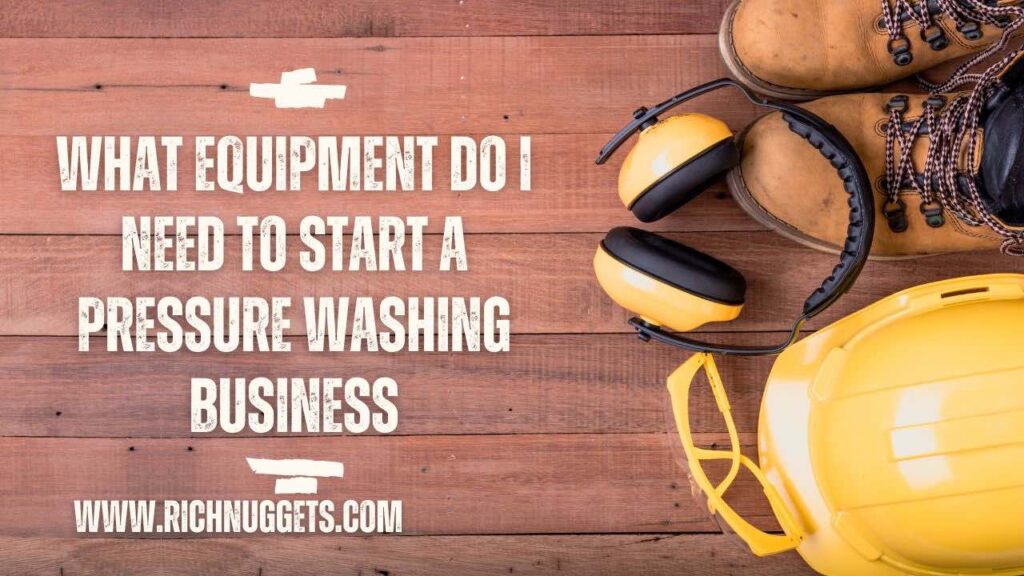
To start a pressure washing business, you will need the following equipment:
Pressure Washer:
Invest in a high-quality pressure washer that suits your business needs.
Consider factors such as pressure output (measured in pounds per square inch or PSI) and water flow rate (measured in gallons per minute or GPM). Just so you know, a higher PSI doesn’t necessarily equate to better performance.
Look for a power washer that offers a minimum of 2.5 gallons per minute (GPM) and a gas-powered unit with a PSI (pounds per square inch) with a minimum of 2,000.
The GPM, indicating the gallons of water delivered per minute, serves as a more reliable indicator of a power washer’s effectiveness compared to PSI.
Remember, It is crucial to prioritize investing in a high-quality pressure washing machine that aligns with your budget.
Nozzles and Attachments:
Purchase a set of nozzles and attachments to modify the spray pattern and intensity based on the cleaning requirements.
Common attachments include fan nozzles, rotary nozzles, surface cleaners, extension wands, and gutter cleaners.
Common nozzles and attachment options include a 0-degree nozzle for intense, concentrated pressure, a 15-degree or 25-degree nozzle for general-purpose cleaning, a 40-degree nozzle for wider coverage, and a detergent application attachment for applying cleaning solutions.
Hoses and Connectors:
Get durable hoses and connectors to supply water from a water source to your pressure washer. Ensure they have the appropriate diameter and length to reach different areas during your cleaning jobs.
Additionally, consider investing in a hose reel to keep your hoses organized and prevent tangling.
Detergents and Chemicals:
Depending on the type of cleaning tasks you undertake, invest in a range of cleaning solutions and chemicals. This may include general-purpose cleaners, degreasers, mold and mildew removers, and concrete cleaners.
Ensure you have appropriate storage containers and a system to mix and dispense the chemicals safely.
Safety Equipment:
Prioritize safety by investing in personal protective equipment (PPE) for yourself and your employees. This may include safety goggles, gloves, hearing protection, slip-resistant footwear, and protective clothing.
Ladders and Scaffolding:
Depending on the height of the surfaces you’ll be cleaning, you may need ladders or scaffolding to access hard-to-reach areas safely.
Surface Protection:
Consider purchasing tarps, drop cloths, or plastic sheeting to protect sensitive areas or landscaping elements from overspray or debris.
Equipment Trailer or Truck Mount:
If you plan to offer mobile services, you may need a trailer or truck-mounted system to transport your pressure washing equipment conveniently.
Maintenance and Repair Tools:
Equip yourself with basic tools for maintenance and repairs of your pressure washing equipment. This may include wrenches, pliers, socket sets, lubricants, and spare parts specific to your pressure washer model.
Vehicle Signage and Marketing Materials:
Invest in signage for your vehicle(s) to promote your business while on the go. Additionally, consider creating marketing materials such as business cards, flyers, and a website to advertise your services.
Remember, it is essential to maintain and clean your equipment regularly to prolong its lifespan and ensure optimal performance.
How to Start a Pressure Washing Business
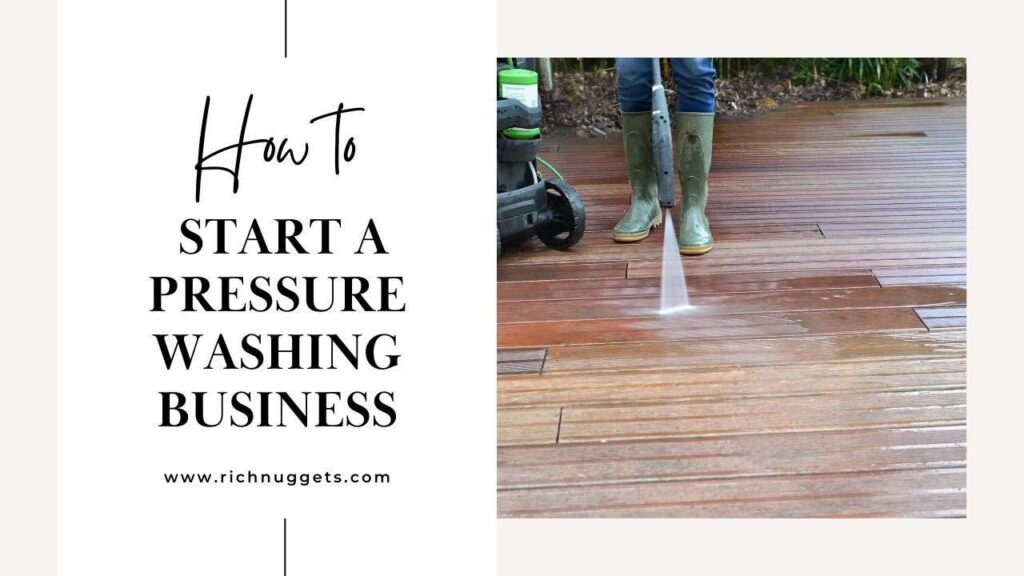
Hone your Pressure Washing Skill
When it comes to pressure washing, precision, and caution are essential. The high water pressure generated by a pressure washer can effectively remove surface debris, but it also carries the potential to cause unintended damage.
To ensure you possess the necessary expertise in pressure washing techniques, there are several avenues you can explore.
Consider enrolling in a local pressure washing training, where you can receive hands-on instruction and guidance from seasoned professionals.
The courses from the training cover topics such as proper nozzle selection, pressure adjustment for different surfaces, and safe handling practices.
In addition to formal training, gaining practical experience can significantly enhance your skills. Consider working for an established pressure washing company or partnering with an experienced professional who can provide guidance and mentorship.
This on-the-job experience will expose you to various scenarios, allowing you to develop your technique and problem-solving abilities.
Furthermore, leveraging online resources can supplement your learning journey.
As you strive to become proficient in pressure washing, remember that practice is key. Therefore, dedicate time to honing your skills and refining your efficiency.
The more you practice, the more adept you will become at assessing surfaces, adjusting pressure settings, and achieving optimal cleaning results.
By prioritizing proper training, practical experience, and continuous learning, you’ll be well-equipped to deliver exceptional pressure washing services while safeguarding the surfaces you work on.
Pressure Washing Business Plan
Creating a comprehensive business plan is a crucial step in establishing a successful pressure washing business. It serves as a roadmap for your venture, outlining your goals, strategies, target market, financial projections, and more. Here are the key elements to include when creating a business plan for your pressure washing business:
- Executive Summary
- Business Description
- Market Analysis
- Organization and Management:
- Services and Pricing
- Marketing and Sales Strategy
- Operational Plan
- Financial Projections
- Risk Assessment
Also include an “Appendix Section” where you make provision for supporting documents, such as market research data, resumes of key team members, licenses and permits, supplier agreements, or legal documents.
A well-crafted plan will not only guide your business decisions but also serve as a valuable tool when seeking financing, partnerships, or expansion opportunities.
Get the Legal Side Up and Running
Launching and operating a successful pressure washing business requires careful planning and adherence to legal and business considerations.
In this section, we will explore the necessary steps to establish your pressure washing business while ensuring compliance with legal requirements, selecting an appropriate business structure, and organizing essential paperwork.
By following these guidelines, you can set a solid foundation for your business and attract customers effectively.
Step 1: Choosing a Business Name and Legal Structure
When establishing your pressure washing business, selecting an attractive and relevant name is crucial.
It should be easily remembered and have a matching domain name for online presence. It is recommended to avoid complex spellings and check for name availability.
When you settle the business name, you will need to determine the appropriate legal structure for your pressure washing business.
Here are 4 business structures to consider;
- Sole proprietorship,
- Partnership,
- Corporation,
- Limited liability company (LLC).
Researching each option’s pros and cons will guide you in making an informed decision.
Step 2: Obtaining Licenses, Permits, and Insurance
To operate your pressure washing business legally, you must comply with licensing, permitting, and insurance requirements.
Contact your local licensing office or county clerk to understand the specific permits needed in your area. If you are unsure of whom to contact, simply search “find my county clerk” on Google to locate the relevant authority.
Acquire a business license, bonds, and any necessary permits for pressure washing operations and environmental compliance.
Additionally, securing insurance coverage is vital, including liability insurance, equipment insurance, and workers’ compensation.
Insurance protects your business, employees, and clients from potential risks and accidents.
Step 3: Managing Finances and Legal Obligations
Efficient financial management is essential for the success of your pressure washing business.
Open a dedicated business bank account to separate personal and business finances, ensuring legal and tax compliance.
Consult with financial professionals to determine the appropriate tax structure for your business, such as self-employment taxes and sales taxes. Familiarize yourself with tax laws and obligations to avoid any legal complications.
Get Your Pressure Washing Equipment
To start a pressure washing business, you’ll need the right equipment to effectively and efficiently clean various surfaces. And the equipment you need for your pressure washing business has been previously given.
In addition to that, when purchasing pressure washing equipment, consider factors such as reliability, durability, and manufacturer warranties.
Research reputable brands and read customer reviews to make informed decisions. Additionally, explore local suppliers, home improvement stores, or online retailers specializing in pressure washing equipment.
Remember to follow proper maintenance and safety protocols for your equipment to maximize its lifespan and ensure safe operation.
Regularly inspect and clean your pressure washer, store it in a secure and dry location, and perform routine maintenance tasks as recommended by the manufacturer.
Investing in quality equipment from the start will help you deliver professional results and build a reputation for excellence in your pressure washing business.
Set Your Fees
To establish an appropriate fee structure, it’s beneficial to conduct some research and assess the average costs in the pressure washing industry.
This will give you a starting point for determining your rates.
For residential services, homeowners typically spend a minimum of $100 for a home pressure wash.
Here is some common minimum pricing by most companies in the pressure washing business
The exterior siding of a home: $100
Driveway: $80
Deck or patio: $250
For commercial properties, rates usually range from $0.15 to $1.50 per square foot for the exterior surface area.
However, pricing may vary based on factors such as;
- The building structure
- The rental cost of specialized equipment if needed, or demanded by clients
- Additional service that rises up during the washing process.
In addition to standard residential and commercial pressure washing, you may offer specialized services tailored to specific industries.
For instance, vehicle cleaning typically costs at least $50, while washing semi-trucks and boats may be double that amount.
It’s important to adjust your pricing based on the specific requirements and complexities of these specialized jobs.
But keep in mind that pricing should not be static. Regularly evaluate and adjust your rates to stay competitive and account for factors such as location, market demand, and overhead costs.
Factors such as equipment maintenance, insurance, and labor expenses should be considered when determining your final pricing to ensure a reasonable profit margin.
By offering competitive pricing, delivering high-quality service, and continuously assessing and adapting your fees, you can attract customers and establish a strong reputation in the pressure washing industry.
Marketing and Growing Your Pressure Washing Business
Promoting your pressure washing services is crucial for attracting customers and expanding your client base. Develop a comprehensive marketing strategy that includes marketing strategies such as;
- Creation of a professional website,
- Usage of social media platforms,
- Leveraging online advertising
- Establishing partnerships with local businesses,
- Offering referral incentives, and
- Providing exceptional customer service ( This one is an effective way to generate positive word-of-mouth advertisements).
With those marketing and promotional channels fully utilized, you can be rest assured of getting the clients for your business.
Startup Cost for Pressure Washing Business

Starting a pressure washing business can be a lucrative venture in the home improvement industry.
However, it’s crucial to consider the initial costs involved in setting up your business.
In this section, we will explore the various equipment and expenses you need to budget for when starting a pressure washing business.
Equipment and Price Ranges:
| Equipment | Price Range |
|---|---|
| Pressure Washer | $180 – $6,000 |
| Truck or Van | $20,000 – $40,000 |
| High-pressure Hoses | $20 – $100 |
| Detergent and Chemicals | $10 – $50 |
| Nozzles | $7 – $50 |
| Advertising | $50 – $6,000 |
| Business Set-up Expenses | $500 – $2,000 |
The total estimated cost range of starting a pressure washing business is: $20,767 – $54,200
Please note that the total estimated cost range is a rough estimate and can vary based on factors such as the specific equipment brands/models chosen, advertising strategies, and any additional expenses related to business setup.
Remember to research and compare prices from different suppliers to ensure you get the best value for your investment.
Key Resources:
- How much does it Cost to Start a Business?
- What business can I start with no money or experience?
- How to Start a Business with No Money
- The 7-Step Guide: How to Start a Cleaning Business Successfully
- How to Start a Small Business: From Idea to Reality
Conclusion
According to Guru;
By 2026, the global pressure washing market is estimated to expand to a value of USD 3.0 billion, exhibiting a Compound Annual Growth Rate (CAGR) of 4.2%.
Furthermore, the Pressure Washing Industry is projected to witness a 4% growth rate, leading to the creation of 156,200 job openings between 2018 and 2028.
This means there is room for more competitors to thrive in this industry.
Remember, providing value to your customers while maintaining profitability is key to the success of your pressure washing business.
With this comes the conclusion on how to start a pressure washing business.
If you have questions or contributions, please leave them in the comment section below 👇
Remember to turn on the Bell 🔔 Notification icon to get updated directly on your device when new articles are published.

